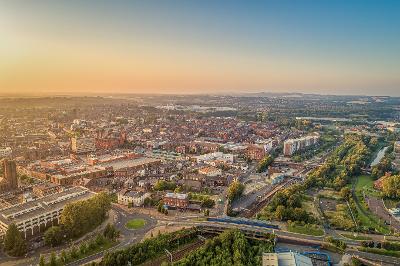Harmful greenhouse gas emissions down as council looks to renew Climate Change Action Plan
A positive reduction in greenhouse gas emissions is reported by St Helens Borough Council, as its Climate Change Action Plan is renewed for the year ahead.

Article date: 24 September 2024
A report to cabinet - set to be considered by members on Wednesday 25 October - details the progress being made on the plan's previously defined actions, and how they're helping to move the needle towards the council's net-zero by 2040 target.
Annual reporting of the council's greenhouse gas emissions for the year 2023-2024 has shown a significant reduction of 68.6 percent against the baseline year 2009-2010, and a reduction of 9.8 percent compared to the previous 12 months.
The drop in harmful emissions is attributed to a reduction in gas consumption in council buildings, reduced use of petrol and gas in fleet vehicles, and a reduction in oil and gas used in schools, decreased electricity use in council buildings, street lighting and traffic signals; thanks to recent building improvements and the introduction of 34 electric vehicles (EVs) to the council's fleet.
Other significant accomplishments include adoption of the council's new Resource & Waste Strategy in autumn 2023, focusing on increased community engagement and an enhanced kerbside sorted service that is generating higher quality materials for recycling.
A long-term plan to improve local cycling and walking infrastructure has been adopted, which aims to increase active travel - improving health and wellbeing and reducing emissions - over the next 10 years.
Meanwhile, the council has been savvy in securing £6 million through various funding bids during the last 12 months to support its ambitious net-zero goal.
Proposals for the updated plan detail more than a dozen key opportunities to be progressed during the next 12 months, including construction of a substation at Hardshaw Brook Depot, expanding the site's electric vehicle charging capability.
Elsewhere, progress is to be made on plans for revolutionary renewable energy technologies that would use waste heat from industry to provide low-carbon heating in St Helens town centre.
A new action proposes closer work with the Liverpool City Region on the LNRS (Local Nature Recovery Strategy) to highlight areas suitable for habitat restoration and improvement. St Helens Council have already made significant contributions to the consultation on the LNRS, using expertise from their Environment Project Officers.
The updated plan also puts a focus on encouraging the necessary environment-conscious behavioural change across council services, with a new carbon and energy efficiency training programme to be implemented for staff.
Councillor Seve Gomez-Aspron MBE, St Helens Borough Council's Cabinet Member for Transport and Environment, said:
"We are making good progress on our climate change actions and it's evident that we are moving the needle positively towards our ambitious net-zero goal, through programmes like our fleet modernisation, work towards revolutionary renewable energy technologies like heat networks, forward-thinking plans to increase access to active travel infrastructure, and our new Resource and Waste Strategy - made more efficient and better for residents to help them reduce waste and increase recycling.
"But challenges do remain. No one said this work would be easy, but it is essential that we fulfil our small but still critical role here in St Helens Borough to protect the world our children's children will inherit and help to prevent further damage and disaster."




